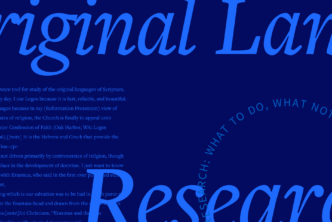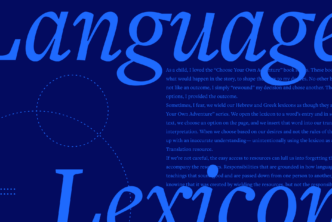I recently posted about the progress we’ve made on our The Lexham Greek-English Interlinear Septuagint (LXX), but that post was primarily about our progress. It didn’t really answer the question, “Why should I worry about the Septuagint?”
Books have been written in attempts to answer that question; several are available for Logos Bible Software:
- The Use of the Septuagint in New Testament Research by R. Timothy McLay
- The Bible in Translation, Ancient and English Versions by Bruce M. Metzger
- The Septuagint by Jennifer Dines, in the Understanding the Bible and Its World Collection (4 vols.)
- The Septuagint as Christian Scripture: Its Prehistory and the Problem of Its Canon by Martin Hengel, in the Second Temple Period Collection (19 vols.)
- The Psalms in the New Testament edited by Steve Moyise and Maarten J.J. Menken, in Psalms: A Commentary, and Its New Testament Relevance (2 vols.)
- Commentary on the New Testament Use of the Old Testament, edited by D.A. Carson and G.K. Beale, in the Baker Hermeneutics Collection (14 vols.)
- There are many more; check out some of the JSOTS volumes and collections
As you can see, much ink has been spilled on the topic of the importance and role of the Septuagint (LXX) in Biblical Studies. I don’t think I’ll answer the question conclusively here, but hopefully I can shed some light on it.
So, why worry about the Septuagint?
Well, for starters, virtually every Bible study method I know of—particularly those geared to students without advanced training in Greek and Hebrew—recommend the consultation of several different Bible translations when examining a passage. Did you know that the Septuagint (LXX) is the oldest translation of the Hebrew Bible that we have?
So, when examining a passage in the Old Testament, it can be helpful to examine the LXX as well because it is another translation. The Lexham Greek-English Interlinear Septuagint makes some of the differences between the Hebrew and LXX available through translation differences and also through notes. Used in conjunction with the Lexham Hebrew-English Interlinear Bible, with reputable commentaries on OT books, and with other English translations, The Lexham Greek-English Interlinear Septuagint can be a benefit to your study.
Second, if you’re studying a New Testament passage that quotes the Old Testament, you should check out the source of that quotation. Many times, the NT author is likely using the Septuagint (LXX) and not the Hebrew Scriptures directly. This means examining the fuller context of the quote source is important to understanding how the NT author is using the passage. The Lexham Greek-English Interlinear Septuagint makes this larger context more accessible, particularly to those who may have only focused on the study of Greek in the New Testament.
(An aside, the best and most comprehensive treatment of the NT’s use of the OT is Carson and Beale’s Commentary on the New Testament Use of the Old Testament, edited by D.A. Carson and G.K. Beale, available for Logos Bible Software in the Baker Hermeneutics Collection (14 vols.))
Third, if you’re studying an Old Testament passage that uses an obscure Hebrew word, looking to the Greek of the Septuagint can help in understanding what may have been in the underlying Hebrew text. This in turn can help in coming to a better understanding of the Old Testament text. Consult lexicon articles (such as those in HALOT) which also mention how these more obscure Hebrew words may have been translated in to Greek; use these as a base to track down other citations that use the Greek word in a similar manner.
The same can be said, perhaps to a greater degree, of obscure New Testament words. Examining the Septuagint use of an obscure NT word can be enlightening. Again, use a lexicon (like BDAG) which classifies senses and provides both LXX and NT citations to hunt down LXX citations to follow up on instances like this.
These are only a few reasons why the Septuagint (LXX) should play a role in one’s study of both the Old Testament and the New Testament. So what are you waiting for? Subscribe to the pre-pub, lock in your low price, and reserve your copy of The Lexham Greek-English Interlinear Septuagint today!




